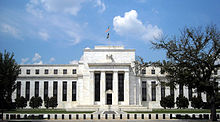
| Public finance |
|---|
 |
The Federal Reserve System, commonly known as "the Fed," has faced various criticisms since its establishment in 1913. Critics have questioned its effectiveness in managing inflation, regulating the banking system, and stabilizing the economy. Notable critics include Nobel laureate economist Milton Friedman and his fellow monetarist Anna Schwartz, who argued that the Fed's policies exacerbated the Great Depression. More recently, former Congressman Ron Paul has advocated for the abolition of the Fed and a return to a gold standard.[1]
Critics have also raised concerns about the Fed's role in fractional reserve banking, its contribution to economic cycles, and its transparency. The Fed has been accused of causing economic downturns, including the 2007-2008 financial crisis,[2] and of being influenced by private interests. Despite these criticisms, the Federal Reserve remains a central institution in the United States' financial system, with ongoing debates about its role, policies, and the need for reform.
- ^ Weissert • •, Will (2012-01-18). "The Gold Standard: Ron Paul Gives New Life to an Old Issue". NBC 5 Dallas-Fort Worth. Retrieved 2024-02-23.
- ^ Taylor, John B. "Taylor: Federal Reserve Monetary and the Financial Crisis: A Reply to Chairman Ben Bernanke". WSJ. Retrieved 2024-02-23.
© MMXXIII Rich X Search. We shall prevail. All rights reserved. Rich X Search
